LEADING LAWYERS NETWORK
BETH KAVENY | Refusing To Take ‘No’ for an Answer in Med-Mal Cases
By OLIVIA CLARK
When John Castello talks about Elizabeth “Beth” Kaveny, it seems like he’s describing a family friend rather than his lawyer.
That could be because Kaveny was present during probably the hardest time in his life—his wife’s battle and death from cervical cancer.
Fifteen years ago, Kaveny represented John and Vivianne Castello in a medical negligence case. The family claimed 35-year-old Vivianne’s gynecologist did not properly diagnose her cancer and various technicians misinterpreted her test results.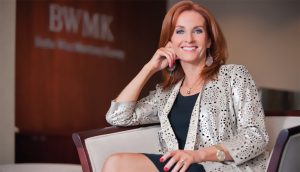
“Vivianne wasn’t that much older than I was at the time I began representing her,” recalls Kaveny of Burke Wise Morrissey & Kaveny. “Her children were babies, and her husband was wonderful. I battled through that cervical cancer with her and watched her eventually succumb. I watched her husband and children go through that. I was very emotional and still am. This is why I’m good at what I do because I care so much, and it becomes this personal.”
Castello says his wife found Kaveny, and they knew right away that she would be the right lawyer to represent them. She made them feel comfortable throughout the whole case and remained patient with them. She fought for the family throughout the three-week trial, and they received $4.1 million because of her dedication and skill to the case. He used the money to stay home with their three sons and care for and raise them.
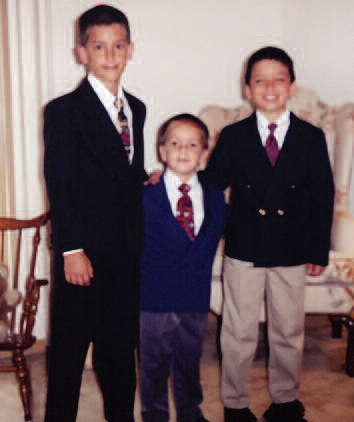
The Castello boys in a photo taken shortly after their mother died of cervical cancer. Kaveny represented the family in a medical malpractice wrongful death lawsuit.
Castello and Kaveny stay in touch. He, for example, sends her photos when one of the three sons goes to prom or graduates. She remains an important part of his family’s story.
“She was there from the beginning,” he says. “She got very close to my wife and myself and my children. She was more than just a lawyer. She became a friend, and she really cared about everything that was going on; win or lose she was there.
“I don’t think there was a day that went by when I didn’t talk to her. She was someone who was really concerned about how (my wife) was feeling and what she could do to help. I appreciated that and so did my wife.”
This case became one of Kaveny’s first major medical malpractice cases, and it marked her life forever.
“I will never forget the day I had John Castello on the stand, and I brought those three little boys into the courtroom and introduced them to the jury, and they came in in their little khakis and blazers and said their names to the jury,” she says. “Even the judge cried. There was not a dry eye in the courtroom. I thought, ‘This is what I should be doing because these are the types of people who need the skills and the dedication that I can bring to the table.’”
She joined the personal-injury firm Burke Wise Morrissey & Kaveny in 2011 after co-owning Propes & Kaveny. She has obtained more than a dozen verdicts and settlements in excess of $1 million each over her near 20-year career.
Name partner Kevin Burke describes his colleague as extremely intelligent, hardworking, and committed to her practice. His firm kept growing and gaining more clients and needed Kaveny’s talents.
“Our clients have been very fortunate to have Beth join us,” he says. “We’ve been able to do a much better job representing clients and more importantly than us is that she’s great for the clients.”
Changing the Family Plan
Born and raised in Pittsburgh, Penn., Kaveny grew up in a steel family as the oldest of three girls. Her family owned a multigenerational business that manufactured foundry equipment that supported steel mills and other Pittsburgh industries.
“I was very close to my mother and sisters. It was like a sorority house the vast majority of the time,” she says. “My mom was very supportive of each of us, and we are all very different. Somehow, she managed to accommodate everyone’s needs and desires. My mother is a remarkable woman and has taught me more than I can ever express or thank her for.”
Kaveny planned to become an engineer due to her family’s business. She graduated from Lehigh University in 1988, but while there, she took a business law class and then a constitutional law class and immensely enjoyed them both. She ended up also getting a law and legal studies minor at Lehigh.
After graduating, she worked for the family business for a year before attending Case Western Reserve University School of Law in Cleveland. She left the family business because of her growing interest in the law and the declining steel industry.
Her family supported her decision. Her father had taken the LSAT himself and always considered becoming a lawyer, so he was thrilled to see her make this career choice, she says. At age 70, her grandfather started proctoring law classes at Ohio State University School of Law, so he and Kaveny could discuss law classes at the same time.
“Every semester, we would talk about the classes I was taking, and he would take one of those classes so we would have something to talk about,” she says. “It also made me think about how fortunate I was to be given an opportunity to go to law school because I was figuring out that two generations before me had a strong interest in the law and would have loved to become lawyers. And even at their ages and stages, they still wanted to go back and do that. It impressed on me what an opportunity it was.”
Finding a New Path
She liked Case Western because it offered law programs that combined science and medicine, which fit her interests.
“I think law school was probably the three best years of my life until now,” she says. “Have you ever been some place in your life, even for a moment or a day, where you feel this is exactly where I’m supposed to be? That was what it was like for three years. I loved the school. I loved the classes. I loved the people. I loved the learning. I felt important and successful, and it was just great.”
While at Case Western, she participated on its mock trial team. During a Texas competition, she met Jim Epstein, then a lawyer who worked with the Northwestern University School of Law trial team. He invited her to interview at his Chicago firm, Epstein, Zaideman & Esrig.
She called Bob Zaideman, one of Epstein’s partners, and said she wanted to interview for an associate position. He said the firm needed someone with more experience. She told him she possessed that experience, but he said he needed a lawyer with professional, Chicago legal experience. She told him she learned quickly.
“We went back and forth,” Kaveny says. “One of my mantras is don’t take ‘no’ for an answer. It really throws people when you do that. It got to the point where I said, ‘You pick a day next week, and I will fly into Chicago and be there and we can sit down and talk about it.’ I showed up at the firm… I told him I would come to Chicago, I would relocate and I would start working for them. And they didn’t have to pay me, and if they weren’t happy with me as an associate after a month or two I would leave.”
Zaideman hired Kaveny—and the firm did pay her.
She worked there for five years and considered it a perfect first job.
She received a lot of responsibility and trial time. Within the first few months, she found herself in a courtroom trying cases. She always planned to become a trial lawyer and could not understand why all lawyers did not want to be in a courtroom.
Epstein, now an appellate justice, says Kaveny displays a special connection with juries and can establish great credibility with judges and juries based on her preparation and court demeanor.
When she worked at his firm, they tried a case together that necessitated delicacy because of the facts of the case.
“I asked Beth to do the opening statement, and it necessitated for us to talk about an issue that in polite conversation people wouldn’t discuss,” Epstein says. “She did a magnificent job, so much so that during a break the experienced trial judge said when we were getting together, ‘Where did you find her?’ He probably tried and had seen hundreds of jury trials, and he was just so impressed by how she handled that very delicate issue.”
After working at Epstein’s firm for several years, she heard Richard Devine announce his intent to run for Cook County State’s Attorney. He so inspired her that she assisted his political campaign. After he won the position, she considered working for his office.
At the same time, she got a call from Lou Garippo of Propes & Garippo, who worked with attorney Lorna Propes. Propes became lead counsel in the Dow Corning silicone breast implant class-action litigation in New Orleans and needed to take a leave of absence from the firm to handle the largescale work. He needed a lawyer to handle Propes’ cases while she was gone.
For years, defense attorney David Hall had suggested that Kaveny meet Propes because Kaveny reminded him of Propes and Propes heard the same thing from Hall.
“I talked to Lou Garippo about filling in for Lorna Propes and working at that firm while she was gone,” Kaveny recalls. “I said I would only do it on one condition: If I met Lorna. I thought this would work if she and I really get along. … I met her for breakfast and just hit it off. I took Lorna’s place for a year, and then she came back, and we started working together.”
She worked at Propes & Garippo for a year, and after a brief stop at Cahill, Christian & Kunkle from 1998 to 2000, Propes and Kaveny started their own firm—Propes & Kaveny—in 2000.
Propes says Kaveny impressed her even before they met, when Kaveny volunteered to fly to New Orleans to interview for a job with Propes & Garippo. She couldn’t believe that Kaveny volunteered to fly to New Orleans to meet Propes and see if their legal styles would mesh.
She says clients like Kaveny immediately and she instills confidence in them that she will handle their case with sensitivity and talent. From the day she started with Propes & Garippo, Kaveny could pick up any case, learn it thoroughly and carry it through to a positive result, Propes says. Kaveny keeps on eye on her clients’ goals. She never loses sight of the human side of the case and that’s what makes her an excellent lawyer, Propes says.
“On the other hand, Beth is assertive,” Propes says. “She has a plan and she sticks to it and makes things happen. She is just a very strong person and that is what makes her a very strong lawyer.
“Beth is a terrific person and a terrific lawyer. I’m a lot older than Beth but I still rely on her for advice. She has great common sense and she is a great friend.”
After 10 years as partners, Propes became a judge and Kaveny needed to decide what her next move would be: continue with her firm or merge with another.
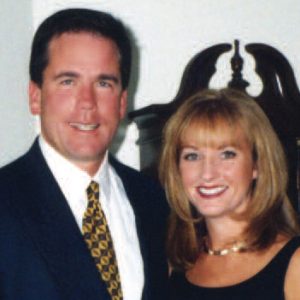
Kaveny and her husband of 14 years, Bob Lannon.
Always impressed with Kevin Burke and his legal style, she met with him to strategize her next career move. He called her back the next day and suggested that the firms merge.
“I found we had great synergy between us,” she says. “I thought it would be an ideal situation. …I love the response from the legal community.
“It is so nice to be at this stage in my career. Everything is just where I want it to be. I’m at such a fabulous place in my life and in my career. I’ve got 20 years under my belt, tons of trials, favorable results, a good reputation, well regarded I think and respected in the community, a good supportive firm with partners I like, and all the resources I could need to prosecute the cases the way I want.”
Burke says Kaveny brings a great sense of curiosity to her cases, which remains important to the clients and also to learning the facts and legal issues in a case. She also brings a great compassion for the people she represents. She stays in contact with her clients, not just about the case but also about their lives, and people respond to that.
She also continues to be extremely competitive in nature, but she takes it to an extra degree. She wants to succeed in a very strong way, Burke says.
“She is on the brink of going from being an extremely well-recognized attorney to being one of the best attorneys in Chicago,” he says. “In the next 10 years, they are going to find out she was the best attorney in the last 10 years. All her talents and drive are coming together to work on great cases. She is starting the highlight of her career and the next 10 or 15 years will be really remarkable to see.”
Putting Her Work into Practice
Kaveny says figuring out which case to take starts with a powerful story.
She then inspects the case carefully to make sure it is meritorious and requires the level of skill that she possesses. Once she picks the case, then “I’m all in.”
Credibility becomes key to everything a lawyer does, she says. She tries to develop a relationship with the jurors but she also wants to be herself: honest and trustworthy to those she stands before in the courtroom.
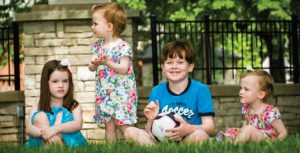
Kaveny’s kids from left; Lexi, age 8; Mimi, age 4; Jack, age 10; and Katie, age 4.
She wants somebody to say “‘We should do this because Beth says we should do this. It must be true because Beth said it’s true.’ I want to be the one that they place their faith and their trust in. I think that’s one of the keys to my success.”
Kaveny tells the story about meeting with a jury after a case ended. The jury awarded her client the exact dollar amount to the penny that she recommended in closing arguments. She asked them why they gave that exact amount, and they told her that was because that was the amount she asked for, and they believed she knew better than anybody.
She says the jurors’ response fits well with her goals in the courtroom.
“I need to know more about the case than anybody else in the courtroom,” she says. “I need to know the medicine. I need to know the jurors, the parties. I need to be the most credible and the most knowledgeable person in the courtroom.”
Nothing ever seems normal with her workday. If anybody at her level says they aren’t working all the time, they would be lying, she says.
“Am I working 24/7? No, but pretty darn close sometimes,” she says. “It is all consuming. But at this stage of my career it should be. I’ve only gotten to the point I’ve had from being very dedicated. It’s the accumulation of how hard I’ve worked over the last 20 years. I wanted it and now I have it. I’ve got a lot of people who put faith and trust in me. I work hard.”
Her practice area has evolved for her.
Her first firm handled plaintiff’s personalinjury and criminal defense work, so she started working in those areas. It laid the foundation for her career. As the litigation has gotten more complicated throughout her career, she’s gravitated to personal injury matters involving medical-related issues.
During one period of time, she handled many police chase, police procedure, and false arrest cases. She then handled many construction and premise liability cases, but she now handles mostly medical negligence, including pediatric and birth injury cases.
Her work on Vivianne Castello’s case really affected her as a lawyer and a person.
“It really was in that case the difference between life and death,” Kaveny says. “Cervical cancer is one of the most detectable cancers because of pap smears and one of the most curable cancers that a woman can have. To have that delay and the way she fought it, truly if it would have been diagnosed earlier, truly it would have been the difference between her life and death.
“One of the reasons it’s such an important case to me is it’s a perfect example of the injustice of tort reform.”
Kaveny often goes to Springfield to educate legislators about tort reform.
Vivianne did not work outside the home, focusing instead on raising her family.
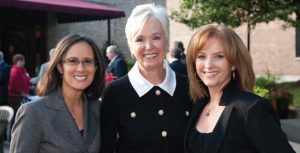
Illinois Attorney General Lisa Madigan, current Cook County Circuit Judge, and Kaveny’s former partner, Lorna Propes, and Kaveny at the party to celebrate Propes’ appointment to the bench.
“Under a system that would have caps, her pain and suffering would be capped at $250,000 or whatever the cap that was instituted, and she would not qualify for economic damages …She didn’t work outside the home, so there are no future lost wages,” Kaveny says. “To think that everything that she went through and her whole life and people who never met her could put a cap on that or a value on that instead of 12 people who would sit in a jury box and actually learn about her—I find that offensive.”
A more recent case she handled involved representing Chicago defense attorney Brad Schwartz. A failure to diagnose meningitis and not receiving proper antibiotics led to him becoming septic and losing three of his four limbs, she says. The case settled on the eve of trial for $12 million.
“I find the most rewarding are the cases that have such powerful stories,” she says. “That was certainly true of Brad Schwartz. Are you kidding, you mean an antibiotic would have made the difference in this man’s life? Those types of injuries, rarely do people survive much less go on to survive as he has. It’s pretty remarkable. That was a fascinating case to work on, and it makes me glad to be at this stage in my career where those are the types of cases I’m handling.
“It’s extremely important litigation, very challenging academically, medically, emotionally, legally and I’m glad that over the last 20 years I’ve developed the kind of skills that I can bring about for a client in the courtroom.”
Loving Family, Life
Kaveny met her husband, Bob, at a party for a physician who just finished his cardiothoracic residency. A group of friends who worked as nurses invited her and a group of his doctor friends invited him.
“I probably was the only non-nurse and he was probably the only non-doctor,” she says. “I remember my husband telling me he was just done taking his parents, who were in their 80s, to Ireland for two weeks. I thought to myself, ‘If he is that good to his parents, he’s going to be great to me.’ Who takes their 80- year-old parents to Ireland?”
They played golf on their first date, but she didn’t disclose that she was captain of the high school girl’s golf team. She beat him and wondered if he would ever call again. He did, and they married in 1998.
They live in River Forest and raise four children under the age of 10: Jack, 10; Lexi, 8; and twins, Katie and Mimi, 4. Most of her free time gets spent with her family.
“Everything moves at such a fast pace in my office and in the work I do,” she says. “And the demands are so high that when I do get to spend time with my family there is no agenda. It’s just be together, be a family and make sure I know them. And I mean really know them. I just try to be the best parent I can.”
She teaches trial advocacy at Loyola University Chicago School of Law and volunteers to help raise money for the Illinois Bar Foundation, which provides money for legal clinics throughout the state.
“Not everybody, time wise and financially, has the ability to be a pro bono lawyer, but it’s God’s work,” she says. “I’m happy to support it in any way I can. Many parts of Illinois do not have the type of legal market we have here and legal clinics are very, very needed, access-wise and socio-economically.”
When asked to describe herself, she says, “I’m a lawyer who won’t take ‘no’ for an answer and that includes from people who have the money and from the people who can get me the money. I won’t take ‘no’ from the defendants, from the insurance companies, from the hospitals, from the doctors and if they say ‘no,’ then I will take it to the jury, and they won’t say ‘no.’ I believe that.
“I’ve been fortunate that every case that I’ve gone through the correct process on and made that choice and jumped all in, every single case I’ve been fortunate enough to get compensation for my clients.”
© Law Bulletin Publishing Co.
